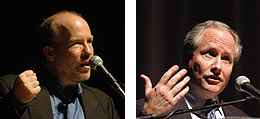Berkeleyan
Do we need a new president? Yes and no . . .
Conservative editor William Kristol and Berkeley journalism professor Mark Danner square off on Bush’s record
![]()
| 08 October 2004
 Mark Danner (left) and William Kristol took sharply different positions on the question of a second Bush term in their exchange last week. (Peg Skorpinski photos) |
“It’s great to be here in Berkeley — I think,” quipped the affable Kristol, best-known as a pundit for the Fox News Channel, soon after taking the podium situated, a bit incongruously, at the left of the stage. For the next 90 minutes, Kristol gamely faced off against Berkeley journalism professor Mark Danner to debate the question, “Does America Need a New President?”
Danner, a staff writer for The New Yorker whose reporting from Iraq has recently appeared in The New York Review of Books, answered firmly in the affirmative: “Hell, yes.”
Few in the audience seemed to disagree.
Perhaps the most strenuous efforts at persuasion, in fact, were made by moderator Orville Schell, dean of the Graduate School of Journalism, who tried repeatedly to impose order on a sometimes unruly crowd. Midway through the debate, Kristol elicited boos and hisses by insisting that “Bush never claimed that Iraq posed a real and present threat to the U.S. or the world,” prompting Schell to issue the first in a series of stern warnings. “If you want to yell,” he admonished, “go outside.”
Schell, pleading later with one persistent heckler in the back of the hall to “at least be civil enough to hear these two people out,” triggered some of the loudest and most sustained applause of the evening when he had the man removed by campus police.
In general, the unsurprisingly partisan crowd — which included a smattering of “undecideds,” based on a show of hands in response to a question from Danner — was treated to a vigorous endorsement of regime change in Washington, and a somewhat less ringing endorsement of the current commander-in-chief.
“If you look clearly at the last four years,” asserted Danner, “if you look clearly at the domestic policies of this administration and this president, if you look clearly at the foreign policy of this administration and this president, you will have no doubt that America does indeed need a new president.”
Danner termed Bush’s economic policies “a catastrophic failure,” accusing him of squandering the huge budget surplus he inherited from President Clinton and of engineering “the largest redistribution of wealth upward — up the income scale — in United States history.”
The Bush administration has been “equally catastrophic in protecting Americans,” he added. “It is a great irony of this campaign that George Bush has had two of the greatest foreign policy failures in the history of the United States,” he said — the failure to prevent the 9/11 attacks, followed by the war in Iraq — “and he is running on them.”
‘...absolutely disgusting...’
Referring to past U.S. support for Saddam Hussein, Danner called it “absolutely disgusting” that current members of the Bush administration — including Defense Secretary Donald Rumsfeld and his deputy, Paul Wolfowitz, both longtime allies of Kristol in pushing for war with Iraq — argued for an invasion in part by “pointing to the same [mass] graves that they had allowed to be filled 15 years earlier.”
For his part, Kristol defended the president’s economic performance, maintaining that Bush has done a “competent” job at handling the fallout from the collapse of the dot-com bubble toward the end of the Clinton years. “I don’t think it’s been the greatest economic performance ever,” he said, “but it’s certainly not been a catastrophic one.” He also credited Bush’s aggressive tax cuts for what he said was “a shallower recession and a faster recovery than pretty much any country in the Western world.”
That said, he added, “This is a foreign-policy election.” And while calling Bush’s execution of the war in Iraq “flawed,” Kristol faulted the administration mainly for being “too cautious, too timid, and not radical enough in shaking up our own government.”
“They are trying to prosecute a post-9/11 foreign policy,” he said, “with a pre-9/11-size military, with a pre-9/11 diplomatic establishment and public diplomacy capabilities, with pre-9/11 intelligence capabilities, and all of that is a mistake.”
‘... a tough, dangerous world out there ...’
But the bigger mistake, he insisted, would have been not to act. “It’s a long, tough haul, but it’s a tough, dangerous world out there, and I think historians will look back on Bush and say that given the world he’s inherited, given the challenges he faced, he’s been a pretty competent and pretty impressive president.”
Bush “took a big gamble on transforming the Middle East, but I think it was a necessary gamble,” Kristol said, adding that the president and his advisers “sometimes haven’t thought through the means,” but that “having clarity about the ends counts for a lot.”
Danner, however, contended Iraqis are worse off now than before the U.S. invasion, noting that it was “a daily [or] weekly occurrence” for hundreds of Iraqi citizens to be killed in violent attacks — proportionately equivalent, based on that country’s population, to the nearly 3,000 American lives lost on Sept. 11, 2001.
“Nothing has done more to gain Osama bin Laden support than the Iraq war,” Danner said, calling the war “a recruiting poster for jihad.”
Judged by the standard of making Americans safer, he argued, “it’s absolutely obvious” that Bush “has failed more dramatically than any other president you could name.”
The debate between Danner and Kristol was presented by the San Francisco Chronicle Herb Caen Lecture Series in collaboration with the Graduate School of Journalism and the World Affairs Council of Northern California.

